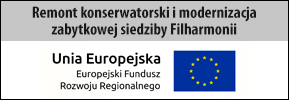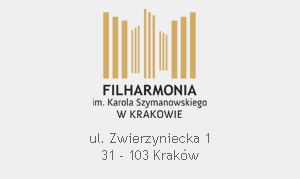



phone no.
506 625 430
open:
30-31.12 - 2pm-7pm

phone / fax no.
+48 504 856 500, + 48 504 063 337, + 48 12 619 87 22
e-mail:
The first information on attempts to create professional symphonic orchestra in Cracow comes from the end of the 18th century. However, the Symphonic Orchestra of professional ensemble status directed by Feliks Nowowiejski-was established only in 1909 and was active until September 1939. During thirty years of its operation it was a branch of the Professional Union of Polish Musicians in Cracow which gathered professional musicians working in various places, coffee shops and silent movie theatres. The Union’s purpose was to protect the standards of living of the associated musicians, keeping standards of artistic creation and promoting classical music to the society through symphony concerts.
During WWI the Union suspended its activities. Following its reactivation in 1919, 80 members' ensemble was established and, as Symphonic Orchestra on 18 May 1919 gave the first concert commemorating 100th anniversary of Stanisław Moniuszko's birth. Initially, the ensemble was concerting sporadically, though in successive years number of concerts increased systematically, especially after the ensemble has been granted a donation from the local government at the beginning of the 1920s. It happened that in the concert season more than 20 events were held. In these times conductors of the Orchestra were such masters as: Zdzisław Górzyński, Piotr Stermich-Valcrociata, Bolesław Wallek-Walewski, Adam Dołżycki, Walerian Bierdiajew. The Orchestra performed symphonies by Haydn, Beethoven, Berlioz, Brahms, Tchaykovsky, overtures and symphonic poems by Liszt, Karłowicz, Strauss, Debussy and many more symphonic pieces. Also instrumental concerts and oratories were presented.
In 1937 the Music Society Board founded an independent section named the Cracow Philharmonic. After the Society resigned from managing this body, an initiative has been taken by Cracow’s Concert Bureau with Eugeniusz Bujański, the manager. It used to provide the professional music management and organize concerts on its own. The ensemble Cracow Symphony Orchestra was concerting until the outbreak of WWII – the last time on 21 May 1939 under the buton of Bronisław Wolfstahl. There was the Symphony no. 5 by Ludwig van Beethoven and the Violin Concerto by E. Młynarski with the soloist Irena Dubiska in the program.
During WWII, by order of Hans Frank, the Governor General in July 1940 the so-called Philharmonic of the General Government (GG) was created. The Orchestra of the GG Philharmonic was formed by Polish professional musicians (outstanding instrumentalists, music schools professors, former members of the Poznan and Warsaw Philharmonics). The only German member of the ensemble was Fritz Sonnleitner, the concertmaster of the first violin section. At first the Orchestra was conducted by Hans Rohr, while the second conductor was Rudolf Erb. After sudden death of Rohr, the position of the conductor was taken up in 1942 by Rudolf Hindemith (a brother of Paul Hindemith, the composer) and in 1944 by Hans Swarowsky. Under such circumstances the Orchestra used to provide protection for musicians. Owing to the employment documents issued by the Orchestra, musicians had avoided being sent to the Reich for the forced hard labour, being called to the Baudienst or deported to Auschwitz death camp as well. This indisputable immunity was managed by Rohr since for him music and musicians were the highest value. The repertoire covered mostly music of German and Austrian composers: Bach, Mozart, Beethoven, Brahms, Strauss. Starting from 1942, after lifting a ban on performing Polish composers, national music by Kurpiński, Chopin, Moniuszko, Noskowski, Karłowicz, Żeleński etc was played. Paradoxically, despite such difficult living and working conditions under the Nazi oppression, the Orchestra was one of the best European orchestras as 'an ensemble with impressive coherence and expression abilities'.
After WWII the Cracow Philharmonic was established as the first one in Poland. The first concert of the symphony orchestra had place on 3 February 1945, soon mixed choir joined and was followed by the Boys' Choir. Having such broad executive opportunities, the Cracow Philharmonic's repertoire specialty were oratorios presented on a regular basis, often at monumental churches of Cracow and during numerous sacred music festivals abroad. Acting as Polish culture ambassador worldwide, the Cracow Philharmonic contributed particularly to performing works of Karol Szymanowski's – its patron since year 1962 and Krzysztof Penderecki's. The Cracow Philharmonic has marked its presence worldwide for more than 40 years. The Philharmonic ensembles were concerting in more than 30 countries-almost in all European countries as well as in Iran, Japan, Canada, South Korea, Lebanon, Turkey and the USA.
The Cracow Philharmonic Hall hosted the most excellent symphony orchestras including: Philadelphia Orchestra /Eugene Ormandy/, Cleveland Orchestra /George Szell/, Suisse Romande /Ernest Ansermet/, Orchestre National de la Radiodiffusion et Television Française /Manuel Rosenthal, Jean Martinom/, Pittsburgh Symphony Orchestra /William Steinberg/, Israel Philharmonic Orchestra /Zubin Mehta/, Czech Philharmonic Orchestra /Karel Ancerl, Vaclav Neumann/, Leningrad Philharmonic Orchestra /Evgeny Mravinsky/, Moscow Chamber Orchestra /Rudolph Barshai/, Virtuosi di Roma /Renato Fasano/, The Bach Ensemble /Joshua Rifkin/, Halle Orchestra Manchester /Stanisław Skrowaczewski/, Jean-Francois Paillard's Chamber Orchestra, Musica Antiqua Köln /Reinhard Goebel/. The concerts were conducted by the most prominent Polish conductors such as: Zygmunt Latoszewski, Bogdan Wodiczko, Witold Rowicki, Jerzy Katlewicz, Kazimierz Kord, Jerzy Maksymiuk, Tadeusz Strugała, Krzysztof Penderecki, Antoni Wit and foreign conductors: Hermann Abendroth, Nikolay Anosov, Roberto Benzi, Roger Desormiere, Dean Dixon, Antal Dorati, Konstantin Ivanov, Paweł Klecki, Helmut Koch, Kirill Kondrashyn, Rafael Kubelik, Gilbert Levine, Jean Martinon, Vladimir Ponkin, John Pritchard, Helmuth Rilling, Jerzy Semkow, Giuseppe Sinopoli, Volker Wangenheim, Carlo Zecchi, Roland Bader.
The position of the Cracow Philharmonic is demonstrated by the number of performing soloists such as: Victoria de los Angeles, Claudio Arrau, Gina Bachauer, Arturo Benedetti - Michelangeli, Cathy Berberian, Stanisław Bunin, Shura Cherkassky, Zara Doluhanova, Dorothy Dorow, Annie Fischer, Emil Gilels, Sidney Harth, Gary Karr, Nigel Kennedy, Leonid Kogan, Gidon Kremer, Nikita Magaloff, Witold Małcużyński, Yehudi Menuhin, Midori, Schlomo Mintz, Tatiana Nikolayevna, Lev Oborin, Garrick Ohlsson, David and Igor Oistrakh, Vlado Perlemuter, Maurizio Pollini, Ruggiero Ricchi, Mstislav Rostropowicz, Sviatoslav Richter, Artur Rubinstein, Izaac Stern, Daniel Szafran, Henryk Szeryng, Narciso Yepes, Yo - Yo Ma, Teresa Żylis-Gara.
High artistic position of the K. Szymanowski’s Philharmonic nowadays is based on its intense concert activity. Except for weekly symphony concerts, the Philharmonic offers serial events in historical halls of the city - University Concerts in the Collegium Novum Hall; masters recitals, organ recitals, concerts promoting music to the youth and children (series 'Musica - ars amanda'). It has a substantial role in reviving cultural life of Cracow – a city of great traditions.
© Filharmonia Krakowska 2010










